
Cannibal Corpse is an American death metal band formed in Buffalo, New York, in 1988, now based out of Tampa, Florida.
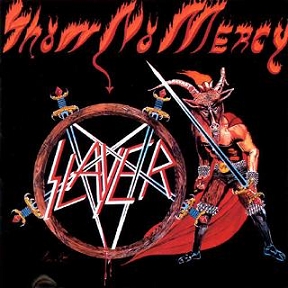
Show No Mercy is the debut studio album by American thrash metal band Slayer, released in December 1983 by Metal Blade Records. Brian Slagel signed the band to the label after watching them perform an Iron Maiden cover. The band self-financed their full-length debut, combining the savings of vocalist Tom Araya, who was employed as a respiratory therapist, and money borrowed from guitarist Kerry King's father. Touring extensively promoting the album, the band brought close friends and family members along the trip, who helped backstage with lighting and sound.

Bleeding Through is an American metalcore band from Orange County, California, formed in 1999. In 2004, Revolver magazine hailed Bleeding Through as one of eight bands ushering in the "Future of Metal" cover story, and Spin called Bleeding Through an "artist to watch" in the magazine's February 2004 issue.

Vol. 3: is the third studio album by American heavy metal band Slipknot, released on May 25, 2004, by Roadrunner Records. A special edition, containing a bonus disc, was released on April 12, 2005. It is the band's only album produced by Rick Rubin. Following the band's tour to promote its second album in 2002, speculation regarding the future began. Some band members had already been involved in side projects including Murderdolls, To My Surprise, and the reformation of Stone Sour. In 2003, Slipknot moved into The Mansion to work on the album. Initially, the band was unproductive; lead vocalist Corey Taylor was drinking heavily. Nevertheless, the band managed to write more than enough material for a new album. Vol. 3 is credited as Slipknot's first to incorporate more traditional, melodic song structures, guitar solos and acoustic instruments.

Tourniquet was an American Christian metal band that formed in Los Angeles in 1990. It was founded by Ted Kirkpatrick, Guy Ritter, and Gary Lenaire. Tourniquet primarily played a mixture of thrash and progressive metal and was influenced by additional, non-rock forms of music such as classical and world music. The band earned six GMA Dove Award nominations and won multiple recognitions from the readers of HM Magazine, including "Favorite Band of the 1990s" and "Favorite Album of the 1990s" for Pathogenic Ocular Dissonance (1992). They released ten studio albums, two live albums, four compilation albums, one EP, and several video releases. The last Tourniquet lineup consisted of Ted Kirkpatrick (drums) and Aaron Guerra. The band disbanded after Kirkpatrick's death in 2022.

Psycho Surgery is the second studio album by the American Christian metal band Tourniquet. It was originally released on Intense Records and Metal Blade Records in 1991. A remastered version was released on Pathogenic Records in 2001 as Psychosurgery and includes revised artwork, an expanded album booklet, and bonus tracks that include live versions of songs featuring then-lead vocalist Luke Easter as well as demos; the title was changed since co-founder and drummer Ted Kirkpatrick always felt that it should have been just one. Retroactive Records released a Collector's Edition remaster on June 26, 2020, retaining the original album title and including an extended booklet as well as different bonus tracks. Considered by critics to be Tourniquet's most balanced of the band's first three albums, Heaven's Metal fanzine ranked Psycho Surgery Christian metal's second-best album of all time.
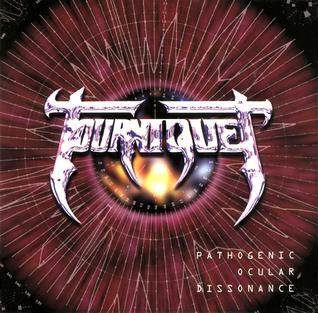
Pathogenic Ocular Dissonance is the third studio album by the American Christian metal band Tourniquet. It was originally released on Intense Records in 1992 to the Christian market and later released on Metal Blade Records in 1993 to the secular market. It is the last Tourniquet album to feature vocalist Guy Ritter, who left the band after the recording of the album. It was independently re-released on Pathogenic Records in 2001 with digital remastering, two bonus live tracks from the 2000 Dutch Flevo Festival featuring then-lead vocalist Luke Easter, and new cover art. Retroactive Records released a Collector's Edition remaster on June 26, 2020 with the original cover art, an expanded album booklet, and four different bonus tracks. Pathogenic Ocular Dissonance was voted as the "Favorite Album of the 1990s" by readers of HM Magazine. In 2010, HM Magazine ranked it #23 on the Top 100 Christian metal albums of all-time list.
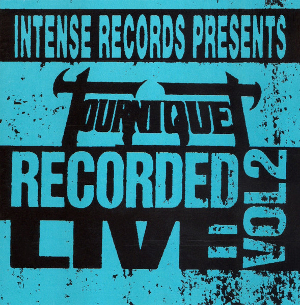
Intense Live Series, Vol. 2 is the first live album by the American Christian metal band Tourniquet. It was released on Intense Records in February 1993. It contains live recordings of material from the band's previous three studio albums, Stop the Bleeding (1990), Psycho Surgery (1991), and Pathogenic Ocular Dissonance (1992), as well as covers of "The Tempter" from Trouble's Psalm 9 album and "The Messiah" from Bloodgood's Detonation album. Les Carlsen, Bloodgood's vocalist, was a special guest vocalist since Tourniquet vocalist Guy Ritter departed from the band prior to the recording of this album. Victor Macias, Gary Lenaire, and Erik Mendez also perform vocals. Session notes by Terry Taylor, the album's executive producer, and a biography of Tourniquet are included in the booklet. Intense Live Series, Vol. 2 was later included as part of the Intense Live Series compilation, which also contained Vol. 1 by Deliverance and Vol. 4 by Die Happy, and released on KMG Records in 1998.
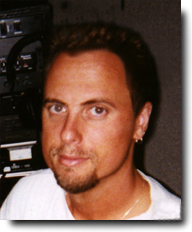
Gary Lenaire is an American musician who primarily performs thrash metal and speed metal. Lenaire is best known for his work in Tourniquet, though later he began to work for BOSS amps and interviewed musicians, including Steve Vai, Marty Friedman, John 5, and Rudy Sarzo. Lenaire was nominated for six GMA Awards, and received Heaven's Metal Magazine's "guitarist of the year" award between 1994 and 1996.

Two Steps from the Move is the fifth studio album by the Finnish rock band Hanoi Rocks, released in 1984. This is their last album to feature drummer Razzle, before he was killed in a car accident on 8 December 1984. It is also their final album to be released before their break-up in 1985.

"The Yeah Yeah Yeah Song (With All Your Power)" is a song by The Flaming Lips, released as the second single from their 2006 album At War with the Mystics. It is their highest-charting single so far in the UK, peaking at #16.

Psalm 9 is the debut studio album by American doom metal band Trouble, released by Metal Blade Records in March 1984. The album was originally released eponymously and later renamed to Psalm 9 after the release of the band's fourth studio album, which was their 1990 self-titled release. Along with Saint Vitus' self-titled debut album from the same year, Psalm 9 is considered by many critics to be one of the first doom metal releases.

The Collected Works of Tourniquet is the first compilation album by the American Christian metal band Tourniquet. It was released on Intense Records in 1996. The album features fourteen songs: eleven songs are taken directly from the band's previous releases, though "The Skeezix Dilemma" has been edited in that it uses the majority of the studio recording and segues into the live version's ending from Intense Live Series, Vol. 2 (1993), and it introduces two new songs, "Perfect Night for a Hanging" and "The Hand Trembler".

"Over Now" is a song by the American rock band Alice in Chains. Written by Jerry Cantrell, who also sings lead vocals, the song is the last track on the band's third studio album, Alice in Chains (1995), and it is about the 1995 breakup of the band. The song closed the televised broadcast of Alice in Chains' MTV Unplugged performance, and that version was released as a single in 1996. The B-side is the original studio version. The single peaked at No. 4 on Billboard's Mainstream Rock Tracks chart, and at No. 24 on the Modern Rock Tracks chart in 1996. The song was included on the live album Unplugged (1996), on the box set Music Bank (1999), and the compilation album The Essential Alice in Chains (2006). The MTV Unplugged concert was the first and only time that Alice in Chains performed the song. It was performed again 23 years later at Jerry Cantrell's solo concert at the Pico Union Project in Los Angeles on December 6, 2019.

Crawl to China is the fifth studio album by the American Christian metal band Tourniquet. It was initially released on Benson Records in 1997. This album took the band's music style to a more simplistic rock sound. The song "Claustrospelunker" includes bass guitarist Tim Gaines of the American Christian metal band Stryper. The lyrics of the song "The Tell-Tale Heart" are based on Edgar Allan Poe's 1843 short story of the same name. Crawl to China was later remastered by Bill Metoyer and released on Pathogenic Records in 2009; an instrumental version of "If I Was There" was included as a bonus track, the track listing was reordered, new album artwork was made by Rex Zachary, and a new booklet layout was designed with new band photos, lyric commentary, and musical notes. A music video for the title track was released in 1997.
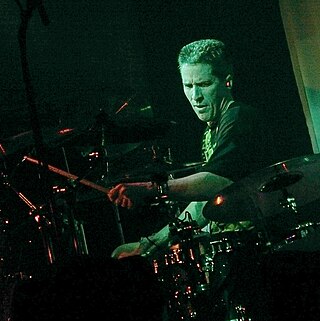
Ted Kirkpatrick was an American musician and songwriter, best known for his work with the Christian thrash metal band Tourniquet. Primarily a drummer, Kirkpatrick was the principal songwriter for the band and played other instruments as necessary.
"Kill to Believe" is a single by Orange County metalcore band Bleeding Through released in 2006 by Trustkill Records. It is the first from their 2006 album The Truth.
"Ark of Suffering" is a song by the American thrash metal band Tourniquet. One of the band's best known songs from their early years, "Ark of Suffering" is the third track from Tourniquet's 1990 debut album Stop the Bleeding. It is widely known for its stance on animal abuse and the music video which contained graphic material on the subject. "Ark of Suffering" is still an almost constant part of the band's live set list, frequently as the opening or closing song.
Guy Ritter is an American heavy metal musician. He is best known as a former vocalist of the Christian metal band Tourniquet.
Bill Metoyer is an American record producer who has recorded with Slayer, Deliverance, Hirax, Morbid Angel, Trouble and Tourniquet. He has worked at Metal Blade Records for several years as house producer and currently works as A&R. He also works with Alpha Omega Management as A&R as well. Metoyer formed Skull Seven Productions.

















